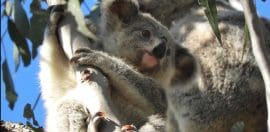Nurturing the next generation of Aboriginal beekeepers

Naomi Abbleby with bees
5 June 2021 at 12:00 pm
“We see beekeeping as the perfect link for young people to learn in the bush with their ancestors.”
For generations, the Yawuru people have collected Melaleuca honey in the Kimberly for medicinal purposes.
Now, a small Kimberly bush honey business is making strides to train young Yawuru people in sustainable beekeeping, providing a way for them to work on and connect to country.
Yawuru woman Dianne Appleby, and her husband David Appleby, started Walaja Broome Bush Honey in 2014. The pair harvest honey from the bees feeding on Saltwater Paperbark and Melaleuca trees planted across Roebuck Plains Cattle Station – a 750,000 acre cattle station owned and managed by the Yawuru Aboriginal Group.
Thanks to a combination of modern beekeeping and a knowledge of native plants, the business has seen enormous growth, producing anywhere between 700 and 800 kilograms of raw, medically-graded honey in a season.
To keep up with demand, Naomi Abbleby (Dianne and David’s daughter) has come on as an apprentice to master the art of queen bee rearing, learning skills from her mum and gaining knowledge about their ancestral ties to Yawuru country.
An opportunity for the next generation
David Appleby told Pro Bono News that beekeeping was an opportunity for young Yawuru people to find work in an industry that would simultaneously help them connect with country.
“We see beekeeping as the perfect link for young people to learn in the bush with their ancestors,” Appleby said.
“Obviously it’s not for everyone, but we would love to be able to offer this opportunity for people to learn this skill.”
He said that the approach Walaja was taking to beekeeping was designed to last, and protect the earth for future generations to come.
“Globally, bees are in danger of being wiped out, you know, and they’re so important for pollination purposes,” he said.
“The bees we use, the European honeybee, are not invasive. They live in harmony with the butterflies and all the other pollinators that we see every day when we’re working.”
Currently, the northern part of Western Australia is a largely untapped resource in the state’s $50 million honey industry.
Appleby said while progress was slow due to being so isolated from the rest of the country, progress was happening.
“We’ll be able to increase ever so slowly but carefully our production of honey. We’ve got a very positive outlook on things,” he said.
“The key is to be able to meet the demand and not go too fast.”







